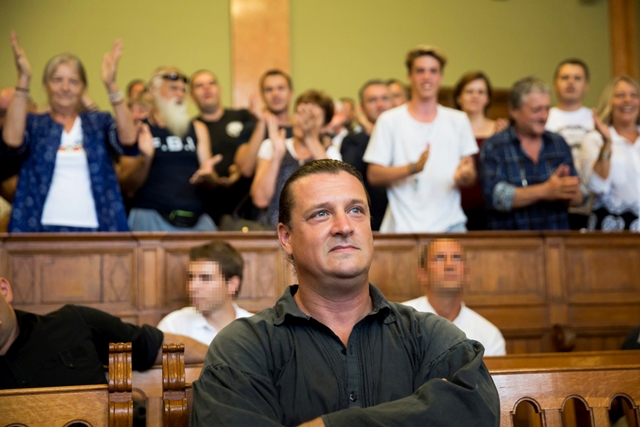A far-right extremist, whose group sadistically assaulted and nearly killed a media personality, bombed gay clubs in Budapest and attacked the homes of Socialist and liberal politicians using Molotov cocktails, received a 13-year prison sentence on Tuesday in the Budapest Capital Regional Court, Hungarian Free Press reports on 30 August 2016.
Between 2007 and 2009, György Budaházy led a group of far-right terrorists, called the “Arrows of Hungarians” (Magyarok Nyilai), which turned to violence, in order to intimidate the governing Hungarian Socialist Party (MSZP) and its liberal coalition partner, the now defunct Alliance of Free Democrats (SZDSZ). The group attacked the home of then Minister of Education István Hiller, the personal residence of János Kóka, who led SZDSZ’s caucus in parliament, and the home of György Szilvássy, the minister responsible for Hungary’s national security agencies.
Mr. Budaházy and his accomplices also physically attacked Sándor Csintalan, a former Socialist politician who had turned into a media personality and host at the pro-Fidesz HírTV news channel. Mr. Csintalan was severely beaten and his home was bombed, after he referred to members of another extreme right-wing group–called the Hunnia Movement–as “hooligans.” Mr. Budahazy’s group used an iron pipe to beat their victim. The men refused to stop beating Mr. Csintalan, until he begged for his life to be spared.
Despite the viciousness of Mr. Budaházy’s crimes, he remains a hero in the eyes of many Jobbik supporters, many of whom turned out to his sentencing, cheered and gave a standing ovation to the convicted terrorist, as he walked into the courtroom.

In addition to Mr. Csintalan’s beating and the bombing of the private homes of left-centre politicians, Mr. Budaházy’s terrorist group also bombed MSZP and SZDSZ party offices and blew up an ATM machine in the town of Székesfehérvár, in order to steal funds to bankroll their organization. Additionally, Mr. Budaházy and his accomplices attacked two gay bars in Budapest. The prosecution argued that the attacks on the LGBT community were also meant to intimidate and strike fear in the minority community, even though nobody was killed or injured in these attacks. One of the gay bars did have guests inside at the time of the attack, so the fact that that there were no casualties was a result of pure luck.
The prosecution asked for a 20 year prison sentence against Mr. Budaházy and one of his accomplices, as well as sentences of between 10 and 15 years for others involved in the terrorist group. The prosecution highlighted that this was the worst example of sustained and meticulously organized terrorist activity on Hungarian soil in decades.
Mr. Budaházy’s defence, however, contested the terrorism charge and said that the defendant’s actions paled in comparison to those of Islamist terrorists in France and Belgium. “Happy is the country, which has terrorists such as them,” said lawyer István Szikinger of the defendants. He also alleged illegal activity during the police investigation into his client, including the unlawful gathering of evidence by national security officials.
One of Mr. Budaházy’s high profile supporters is Jobbik MEP Krisztina Morvai, who attended the sentencing hearing in Budapest. Ms. Morvai began screaming in the middle of the sentencing hearing, after the prosecution informed the judge that it felt that the 13 year sentence was too lenient and asked for the justice consider the original request of 20 years in prison.
“Even in the fifties this trial would have been unprecedented”–yelled the Jobbik politician, after which she began singing the national anthem. The police intervened and removed all observers from the courthouse. Ms. Morvai, however, was unwilling to leave and showed the police her ID from the European Parliament, claiming she had the right to stay. The officers appeared to accept this line of reasoning and the Jobbik politician was permitted to remain for the rest of the hearing.
Ms. Morvai’s activities on this front are clearly an embarrassment for Jobbik’s leadership– a party that is trying to shake its extremist image ahead of the 2018 national elections.
